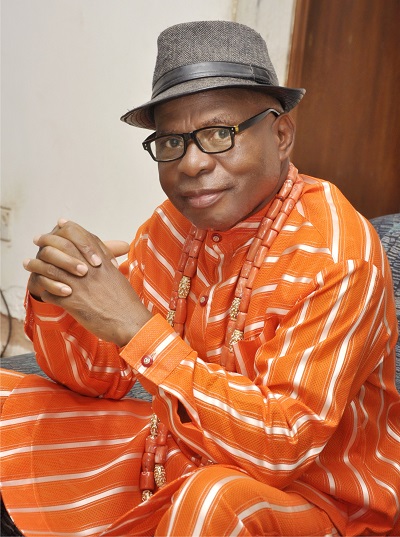Interview with Professor Longy Anyanwu
Today on Authors You Need to Know, we will be introducing Professor Longy Anyanwu.
Professor Longy Anyanwu is a lecturer, public speaker and author of many great books. Today we had the opportunity to interview him. We will be discussing about him and his latest book titled: THE ORIGIN AND HISTORY OF OBOLLO ANCIENT KINGDOM.
Good morning.
Professor Longy Anyanwu: Good morning.
Please. What’s your name sir?
Professor Longy Anyanwu: My name is Professor Longy Anyanwu.
What do you do for a living?
Professor Longy Anyanwu: I am a lecturer at Igbinedion University, Okada.
How old are you sir?
Professor Longy Anyanwu: Oh, I am seventy-two years old.
Okay sir, you are the author of the book, Origin and History of Obollo Ancient Kingdom.
Professor Longy Anyanwu: Yes.
May I know what inspired you to write this book? It has been on my mind to ask this question.
Professor Longy Anyanwu: In fact, and for a while, it has been on my mind to keep the history of Obollo on record for very many reasons. Obollo has not had its traditions, customs, and beliefs on record at all. Moreover, life is changing fast, and lifestyle. A lot is changing very fast and we are losing these elements of identity, history, and culture. The new generation is lost on those things that make the life of Obollo and the identify of Obollo for what they are. Therefore, I decided that we should be able to put the record straight so that the coming generations would be able to know the history, the culture, the traditions, the customs, and the beliefs.
I would like to know some of the challenges you encountered while writing the book.
Professor Longy Anyanwu: There have been several challenges. One is that the finance part of publishing that in Nigeria is different from that of publishing overseas. I have published some other books overseas. In addition, of course, the processing and costs are different; besides, the labor in obtaining information from Elders is enormous. Imagine being told by your senior people, people knowledgeable on the traditions, history, and lifestyle of Obollo. Some of the sources are so weak now, but they can recollect very clearly and articulately. These sources are usually very enlightened. They were glad to pass on valuable information. Moreover, Obollo at this time has not been in quite some peace since the political instability in Obollo leading to, and since, the burning of the Palace of the king. There are quite some political, social, and religious schisms in Obollo, and each faction was engaging in (sometimes-physical) fights against the other. Therefore, peace has not been in, and around Obollo, or for quite some time. Therefore, these are some of the challenges in trying to get information to write the book when people are scattered and suspicious of each other and there is no peace, and the older people are passing on and the younger people are not with any information. They do not know, because these things have not been written previously for anyone to read them and understand. It is only what your parents tell you, sometimes your parents die early, and you have nobody to tell you anything.
Thank you sir. You spoke about many issues, possibly resultant to the lack of peace. Would you kindly highlight some of the issues that led to lack of peace in Obollo?
Professor Longy Anyanwu: To the extent I am aware, that is the realty of things in Obollo. That the king of Obollo, HRH Eze Mbaeyi has been living in exile for roughly two years now, that alone is an indication that things are no wright. Things are not done properly. In addition, there are many instances of matters in or about Obollo, which are presently lodged at the Police or courts, which the courts are deciding now. That means that there are problems in Obollo. You know that the Police at the state and divisional levels have several of matters that they are handling. Individuals and factions are fighting each other. Political groups fighting each other, some traditional groups and villages fighting other groups or villages, and as you know, full peace has eluded Obollo for quite some time.
You spoke about factions. What type of factions?
Professor Longy Anyanwu: They are political factions. They are Social factions. These are all warring. Moreover, there are some villages, which are also warring against other villages. Some villages are at loggerheads with the collective Obollo, particularly the Obollo Patriotic Union, and sometimes with the state governance. So yes.
Can you speak a little about this patriotic union?
Professor Longy Anyanwu: Yes. Obollo has a union, the patriotic union. Sometimes it is called patriotic union, and some other times it is called the association, but it is the local collective governance of Obollo. At a point in time, the State government (under Gov. Rochas Okorocha) changed the structure and renamed it CDC, where the elected President of the Patriotic Union is subjugated to the unelected King. The King becomes the Head of this local government, and the President of the patriotic union becomes the secretary of this governing body, the CDC. Therefore, that is where it is now. It has not been so before this Okorocha’s government of Imo State. Nevertheless, he has his reasons and that many people know those reasons why he did that.
This burning of the King’s Palace, was that expected, or was it unexpected?
Professor Longy Anyanwu: It was not an expected development, although when there is no peace anything can result to anything. Moreover, we must be very grateful to God that we have not lost too many lives during this property loss. We do thank God that Obollo has not been wiped out. People have not even gone to physical micro wars, and villages have not gone to wipe out other villages. It has not gotten to that, but the burning of Eze Mbaeyi’s Palace is hurting. It is not a pleasant thing particularly since the palace is symbolic in Obollo. It is not just a house for an individual, it is symbolic. In addition, when you burn it, you were burn, in a way, the culture and tradition and history of Obollo. Therefore, it is sad, tragic, and regrettable.
Ok sir. You said that the burning of the Palace is symbolic, very symbolic, and I believe it is also symbolic of the legitimacy of the King in the land. I want to know, does the burning of the palace expose the legitimacy or illegitimacy of the king? What does it say about the kingship of Obollo?
Professor Longy Anyanwu: The burning of the palace does not speak to the legitimacy or illegitimacy of the kingship or even the legitimacy of the palace. I hope that it does not speak to that. The burning of the palace speaks to disagreements of real people on real burning issues. Everybody has his own characteristics as to how he eats food, how he talks, or how he walks. In addition, administrators that govern, have their ways of doing so. Governor A has his characteristic way of governance. Governor B has his own particular way of doing things, and they may all be trying to do the same thing but everybody in his own way. Therefore, a ruler who has his way of doing things, his way of doing things may not be acceptable to some people. He may have his reasons and the people may have their reasons. They may agree or they may not agree. However, it does not speak to the legitimacy of the institution or the legitimacy held by the person that is ruling. It does not speak to that. It simply speaks to disagreement to a method of rulership.
- I would like to know, you spoke some time about the opposition of certain villages. What oppositions do you remember and what issue today was on disagreements of some villages to the OPU?
Professor Longy Anyanwu: For instance, say your village legally has a grievance, which it tendered to the people and the King. Because Onye-isi-ala of Ala-iyi-ama has a legitimate claim to the prime ministership of Obollo, and the King, Eze Mbaeyi, for what his reasons may be, decided to give that prime ministership to another person from another village. That created a disagreement or opposition between that village and the rulership, the traditional rulership. And because people appear to not weigh in properly on it or appear not to be in support of what Eze Mbaeyi was doing or appear to know what to do but refusing to do it, therefore this village has grievance about it. Other villages like Umuikiti in Obollo that accused OPU of attempting to indirectly divide the village and recognize a division and not recognize the other. Therefore, these problems started coming.
- Let us go back to issues I would like you to talk about, the chieftaincy.
Professor Longy Anyanwu: Well, Chieftaincy in Obollo, actually, is partly traditional and partly non-traditional. There is a culture in Ibo land. Ibos say “Igbo enwe Eze”. Generally, the Ibos, literally speaking, do not have King or feel they do not need kings to function in life. Therefore, in Ibo area everybody follows the customary behavioral procedures defined in the social and traditional structure, which enables the society to move on with or without a figurehead as king. The Eze, as the king of the kingdom as it is called today, started at some point and became a constituted authority when the British colonized Nigeria, and right after they left in 1960, so some of those structures they created subsisted. So from these came both the Eze-ship hierarchy and the chieftaincy titles and positions. But traditionally to become a chief you go through the process of Nze n’ Ozo. You are installed a chief, in other words, by going through a process. It is not like we donate to the King and then the crown is put on your head. No. You qualify to be installed. In the book, you see the qualifications enumerated. What qualifies you as an Nze or Ozo, what qualifies you as a chief. The way we used to do it traditionally has become different from the way it is done nowadays. You know, nowadays if you will have money you would just give some money and you will become the chief. However, it was traditionally done differently. When you read the book, you find that you cannot even go to chief without going through Nze and Ozo. And of course the know process is followed.
Yes of course, you cannot talk about this book of the history of Obollo without speaking about the current King of Obollo. So what can you say about his administration and claims about his administration?
Professor Longy Anyanwu: I am happy to speak about HRH Eze Mbaeyi’s administration although I am not too happy to talk about the recent events and developments in Obollo under Eze Mbaeyi’s watch. Nevertheless, I will look at it from the point of view of public administration. Eze Mbaeyi’s administration and method of rulership in Obollo are not popular and have not been popular for a while and maybe, he inherited it, so to speak, from his father. The book also illustrates his father’s name, and how the chieftaincy got to his father. Actually what got to his father is what we call the Warrant Chief. The Warrant Chief, the colonialists created in the indirect rule principles. So and when his father passed on there were some processes, which were followed in Obollo detailed in the book, and eventually Eze Mbaeyi was crowned. But his method of rulership and his administration have not been popular in Obollo, and there are many who say that there are grievances. One grievance is that he allegedly takes money to identify his citizens. Most students need and want identifications or identity cards or statements of Identification. It is alleged that Eze Mbaeyi would list the things that would be given to him before he signs the student ID card. And of course, nobody is supposed to demand things in order to identify that this is a son or daughter of Obollo. As a result, many children were frustrated. Some of them used to go to the King of Umuozu. Some go to the King of Ogbor, yet others go to the King of Amaukwu to be identified that they come from Obollo. And many say that that is wrong, and lot of corruption was involved with the kingship of Obollo. Being uneducated, the King uses what he knows but what he knows is small or not enough. So, there is quite a bit of lack and the administration has not been popular.
In Obollo, this has caused some disparity between the chieftaincy and the kingship. I am speaking about Chiefs in different villages in Obollo. Are there other grievances against the Kingship?
Professor Longy Anyanwu: Oh, I have enumerated some already. Particularly I have mentioned the King and the prime ministership. And that has not been so soft in public reaction. Some people say that it is one of the triggering reasons that led to the burning of the palace. Beside the prime ministership agreements or disagreements between the villages and Eze Mbaeyi and administration, other issues perhaps, led to the suspension of formal celebrative gatherings in Obollo. In addition, Umuikiti wrote letters of protest on their grievance to Eze Mbaeyi and to the General Assembly of OPU which letters were not even acknowledged. I was informed that there were some fights at the palace meeting of the King’s Cabinet. I was reliably told that there were some physical fights and challenges. We hear that Umuozu, when they separated from Obollo had issues and disagreements resultant to their separation. And these were some of the reasons why they are separated. Mostly village-based disagreements with the administration in Obollo are either individuals or villages. Nevertheless, when you have one disagreement, which is not treated well, and new development triggers new disagreements or injustices which pileup and are suppressed, at some point they find a vent, the result is what we see today. If these grievances were addressed when they were nursed-up throughout the tenure of Eze Mbaeyi, perhaps, this book would have been of a bigger volume to detail successes.
What do you see as the way forward in Obollo?
Professor Longy Anyanwu: I have already spoken extensively to Obollo General Assembly on a way forward. In addition, as the leader of Obollo Christian Congress, I have spoken to the Christians in Obollo on the way forward. The problems in Obollo are more spiritual than you may see in the physical realm. What you see happening in Obollo, such as the disagreements, the fighting, the killings and destructions, the burning of the Palace, etc., are the aftermath of the disagreements and warring between the spiritual kingdoms that constitute the foundations of Obollo. There are gods that are vying for control of certain aspects of Obollo. And there is a big God that created Obollo and others, who does not want to cede the control of what he made to his creatures. There are spiritual struggles, tussles, and wars for control in Obollo. The physical results of these are what we are seeing happen in Obollo. For instance, we see a house being burned, but we do not see the fightings and wars in the spiritual realm, which resulted to the physical house being burned. When two elephants fight, it is the grass that suffers. We may not see the elephants fight, but the grass there is the evidence of what is happening. No peace can come to Obollo without God. The Christians must pray, and they are seriously interceding and beseeching Heaven for the peace and salvation in Obollo. Obollo must repent and align with the big God, Chukwu. Indeed, Liberation exercises and evangelisms have been conducted and are being conducted. Physically, individual, group, governmental, and social interventions are being conducted to bring all warring parties to a peace table. Self and selfishness must be dethroned and eschewed by all. There is pride and self-worth in humility and boldness in real repentance from our ways, which are the bases of all our disagreements.
You have every need to read the book. Some people have read the book, and have described it as “on target”. That is what everyone in Obollo and beyond need to know about Obollo. The future generations of Obollo will now be properly informed. The book has even been recommended for Obollo children in the schools. You have every need to know about yourself, your ancestors and their lifestyle, your culture, traditions, and customs. As they say, “if you don’t know where you are coming from, you can’t know where you are going”.





